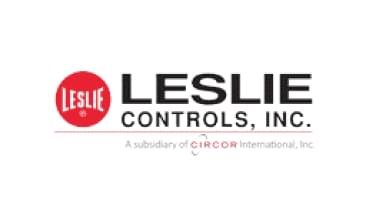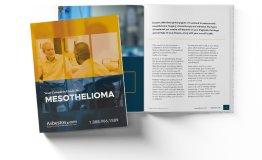Leslie Controls, Inc.
Leslie Controls manufactured a number of asbestos products, including control valves for U.S. Navy ships. In 2010, the company filed for Chapter 11 bankruptcy under the weight of asbestos personal injury lawsuits. It was required to establish a $75 million trust to handle future claims.

Written by Matt Mauney | Edited By Walter Pacheco | Last Update: July 23, 2024
Leslie Controls’ History with Asbestos
Leslie Controls has manufactured control valves for more than 100 years. Leslie’s pumps, gaskets, pipe parts and steam valves were manufactured with asbestos. During World War I and World War II, Leslie provided control valves for U.S. Navy ships.
Asbestos is a naturally occurring mineral known for its resistance to heat, which helped to fireproof Leslie’s products. Unfortunately, exposure to the mineral causes a variety of health issues, including lung cancer and mesothelioma.
Leslie employees who worked in the manufacturing plants where these products were made faced dangerous levels of asbestos exposure. Workers and veterans who handled Leslie’s products were also at risk of exposure that could lead to health consequences.
Today, Leslie is a subsidiary of CIRCOR. Leslie’s products are used in commercial and military marine equipment, oil and gas refining, petrochemical production, power generation, HVAC services and plumbing.
Leslie is now based in Tampa, Florida, where it operates a 150,000-square-foot facility. It continues to produce control valves in addition to actuators, air whistles, regulators and steam water heaters.
In November 2021, the division of Leslie Controls that manufactures train horns was acquired by Florida-based HornBlasters, a market leader in train horn applications.
Leslie Controls Asbestos Trust
Like many other companies that manufactured asbestos products, Leslie filed for Chapter 11 bankruptcy in 2010 under the weight of asbestos personal injury claims. The majority of those claims stemmed from exposure on U.S. Navy ships from 1940 through the 1980s.
As part of the bankruptcy reorganization plan, a trust was created to process, liquidate and pay future claims, allowing Leslie to emerge from bankruptcy protection.
The Leslie Controls Asbestos Personal Injury Trust was established in 2011 with an estimated $75 million. The initial payment percentage was set at 40%. On May 20, 2014, the percentage was set to 5%.
The trust requires that claimants submit a claim within three years of being diagnosed with an asbestos-related disease.

Gain access to trust funds, grants and other forms of compensation for you or your loved ones.
Get Help NowAsbestos Litigation Involving Leslie Controls
Leslie faced thousands of lawsuits filed by its employees who manufactured asbestos valves and by veterans and workers who handled Leslie’s valves in their occupation.
Before bankruptcy filing, Leslie had mixed outcomes in liability cases.
In Merrill v. Leslie Controls, Inc., a U.S. Navy veteran claimed he developed mesothelioma after working with Leslie’s gaskets and valves. He was awarded $1.2 million. Two years later, a district court of appeals reversed the original ruling.
Leslie Controls’ Asbestos Products & Workers at Risk
Leslie’s asbestos-containing products include:
- Control valves
- Regulators
- Steam water heaters
- Actuators and controls
- Insulation
- Pipes
- Gaskets
- Packing
Leslie employees who manufactured these asbestos products faced the highest levels of asbestos exposure. Workers and veterans who handled Leslie’s control valves were also at high risk of exposure.
Occupations at risk of working with Leslie valves include:
- Water treatment plant workers
- Power plant workers
- Chemical plant workers
- Oil or gas refinery workers
- Shipyard workers
- Plumbers
- HVAC workers
- Marines
- Boiler workers
- Industrial workers
- Factory workers
- Insulators
- Machinists
Veterans who served aboard ships were at risk of exposure to the asbestos in Leslie’s valves. The poor ventilation and close quarters inside ships and submarines meant anyone aboard was at risk of asbestos exposure. Veterans who worked in the engine, boiler or pump rooms may have directly handled Leslie’s valves.
A 2018 study reported higher rates of mesothelioma among Navy veterans who worked as boiler technicians, machinist’s mates, pipefitters, firemen and water tenders. These occupations were performed by only 20% of Navy enlistees, but they accounted for 55% of all mesothelioma deaths within that population.
This Page Contains 8 Cited Articles
The sources on all content featured in The Mesothelioma Center at Asbestos.com include medical and scientific studies, peer-reviewed studies and other research documents from reputable organizations.
- Cision. (2021, November 16). HornBlasters Brand Announces Acquisition of assets of Circor Leslie Controls's Prestigious Air Whistles Division. Retrieved from https://www.prnewswire.com/news-releases/hornblasters-brand-announces-acquisition-of-assets-of-circor-leslie-controlss-prestigious-air-whistles-division-301425765.html
- Till, J.E. et al. (2018). Asbestos Exposure and Mesothelioma Mortality among Atomic Veterans. https://www.ncbi.nlm.nih.gov/pubmed/30513236
- Leslie Controls Asbestos PI Trust. (2015, March 25). Re: Leslie Controls Asbestos PI Trust - Claims Filing Deadlines. http://leslie.mfrclaims.com/Resources/Leslie_Controls_Claims_Filing_Deadline_Notice.pdf
- Leslie Controls Asbestos PI Trust. (2013). Payment Percentage. http://leslie.mfrclaims.com/PaymentPercentage.html
- Bloomberg News. (2010, July 12). Leslie Controls seeks bankruptcy for asbestos claims. http://www.businessinsurance.com/article/20100712/NEWS/100719996
- CIRCOR. (2010, July 12). Leslie Controls Subsidiary Files Pre-Negotiated Plan to Permanently Resolve Asbestos Liability. https://investors.circor.com/news-releases/news-release-details/circors-leslie-controls-subsidiary-files-pre-negotiated-plan
- Okamoto, S. (2009, September 29.) No Liability for Failing to Warn About Asbestos. http://www.metnews.com/articles/2009/merr092909.htm
- Leslie Controls. (n.d.). Our History. http://www.lesliecontrols.com/AboutUs/history.htm







